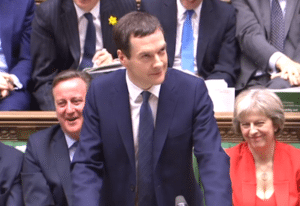
Appearing on the BBC’s news flagship Newsnight the head of the UK’s regulator, the FCA’s Andrew Bailey, has drawn mainstream attention to Bitcoin and the world of cryptocurrencies while admitting that they have yet to understand what he called an ‘odd commodity’. While the BBC’s Kamel Ahmed referring to “links to the criminal underworld” and recent Bitcoin “mania” Bailey admitting “We’d like to understand it” – yet saying Bitcoin is not a currency but “It’s a commodity”.

Referring again to Bitcoin, which anyone not under a rock will know has increased to about 1,700% of its value at the start of this year Bailey referred to it’s ‘volatility’ this year and admitted the FCA does not understand it.
Bailey declared “If you want to invest in Bitcoin be prepared to lose all your money. That would be my serious warning”. No doubt referring to your stake in BitCoin, rather than the ‘all your money’ – the unlimited liability that his words and the warning could suggest.
Inadvertent as this may be I very much doubt it would pass the FCA acid test of ‘fair, clear and not misleading’.
He also complains that in the nature of the technology there’s no central point at which you can look up who’s using it – missing of course the fact the same is true of the pound, the dollar or any cash currency – not to mention any traditional commodity – with the BBC’s Ahmed chipping in, in what by the close seemed to have become something of a double-act, that the process of currency creation is ‘pretty opaque’. When in actual fact it is not only open but as everyone who’s ever studied would know, embodied in open-source code.
 Bailey goes on to say;
Bailey goes on to say;
“If I thought there was evidence that people are saying ‘you know what I’m going to put my pension into bitcoin’, I would be very concerned. Now we don’t see that at the moment. Maybe it’s part of a big portfolio. But again if it is it should be done by people who say it I don’t mind losing all the value of that piece.”
Making the approach clear: Wait for a prominent reason/excuse to act – then pounce. Which does tend to be the approach of many regulators globally.
But there are now a growing number of very honourable exceptions, Canada, Singapore and Gibraltar spring to mind, who instead are taking the trouble to actively engage with what we now know is an internet and life changing revolution, in order understand it.
So that they can do their job properly – which is to deal with scams and scamsters with the minimum of damage to the innovation we all need. Rather than to treat the entire sector as potential criminals, waiting to pounce.
 Which does make one wonder whether with a change of leadership the UK government’s position, and determination to lead the world in Fintech, has slipped since George Osborne’s historic announcement in August of 2014:
Which does make one wonder whether with a change of leadership the UK government’s position, and determination to lead the world in Fintech, has slipped since George Osborne’s historic announcement in August of 2014:
“Just as the introduction of paper money hundreds of years ago revolutionised commerce.So the technologies being developed today will revolutionise the way we bank, the way we invest, the way companies raise money. It will lead to new products, new services, new lenders.
And the exciting thing about combining new technology and a free market is that no one in this room – certainly not me – can predict exactly how these new forms of banking will develop.
What we can do and I can do, is create the best environment in which this financial innovation can flourish. I’m here today because I want the UK the lead the world in developing Fintech”
George Osborne, 6th August 2014
What Bailey and the FCA have perhaps failed to understand is that by making a rare appearance on Newsnight talking about BitCoin, even in these alarmist terms, confirms its importance and will pique interest spurring many people on. Especially those who have lost trust in establishment figures from the banking world such as Bailey himself.
Meanwhile in the USA the head of the SEC Jay Clayton has similarly demonstrated his own difficulty in understanding crypto tokens, saying that he found difficulty in imagining a token he could not classify as a security.
Which is clearly absurd – especially given that around the world and across the industry the experts are seeking clear criteria to distinguish utility tokens – which clearly exist both in the physical world and the crypto one – from those representing securities.
The tone of both the US and UK regulators is very different from those who are seeking to be smarter as regulators, engaging and grappling with the new in order to understand it. Instead resorting it seems to the ‘fear, uncertainty and doubt’ approach to try to damp down adoption – and so further limit innovation.
The games of whack-a-mole are clearly not over yet.
More seriously you do have to wonder what damage must be done to some of the world’s great economies before their governments, and regulators, realise it is in all our interest that they need to harness the experience and insights of the best minds available in order not to shoot themselves, and us all, in the foot. Again.
 Barry E James is author of New Routes to Funding, an influential commentator and global thought-leader on Fintech, ICOs, Tokens and Crowdfunding & their innovation & regulation. A serial entreprenur with a deep background in tech and innovation over four decades he advises ICOs, Crowdfunds and Blockchain ventures on strategy. The instigator of the regulatory ‘Innovation Unit’ (and so sandboxes) he is also co-chair of the joint Westminster Crowdfunding Forum and All-Party-Parliamentary-Group. He is co-founder and CEO of TheCrowdfundingCenter and ICONewsDesk which collect and provide data and unbiased analysis.
Barry E James is author of New Routes to Funding, an influential commentator and global thought-leader on Fintech, ICOs, Tokens and Crowdfunding & their innovation & regulation. A serial entreprenur with a deep background in tech and innovation over four decades he advises ICOs, Crowdfunds and Blockchain ventures on strategy. The instigator of the regulatory ‘Innovation Unit’ (and so sandboxes) he is also co-chair of the joint Westminster Crowdfunding Forum and All-Party-Parliamentary-Group. He is co-founder and CEO of TheCrowdfundingCenter and ICONewsDesk which collect and provide data and unbiased analysis.

